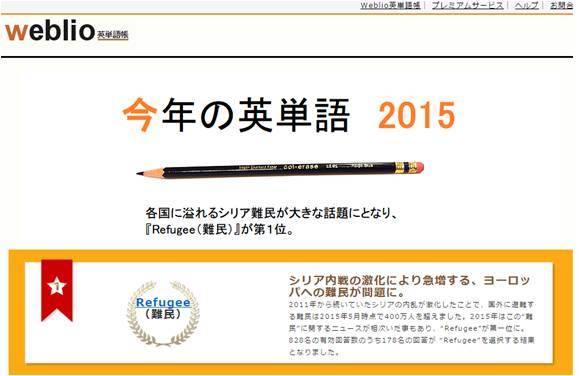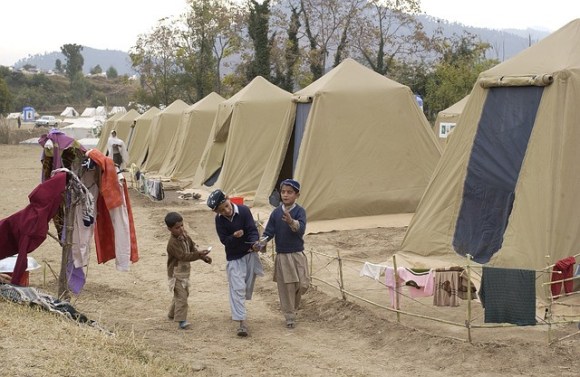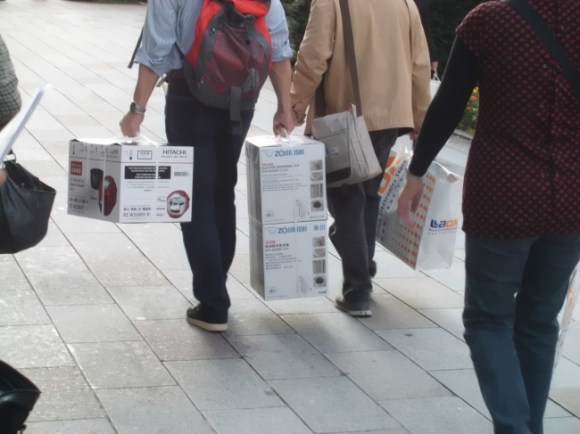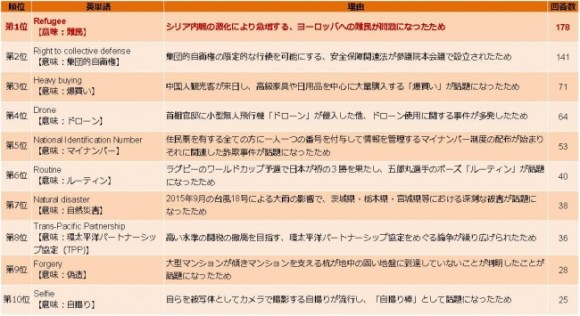
To coincide with Japan’s annual “Kanji of the Year” event, which reveals the mood of 2015 with a Chinese character, popular online dictionary site Weblio asked its Japanese users to nominate an “English vocabulary word of the Year”. The top ten results provide a unique insight into the hot topics of interest in Japan in 2015.
As the year comes to a close, top ten lists begin appearing as we look back at the year that was. One of the more interesting lists we’ve seen comes from Japan’s popular online English/Japanese dictionary resource Weblio, who asked 828 of their members to nominate an English vocabulary word that provides a snapshot into the mood of the nation over the past twelve months. Let’s take a look at the top responses from the survey below.
▼ The top three results provide a great insight into the big topics of 2015. The English vocabulary words, were chosen after being translated from Japanese on the site, giving us several multi-word phrases as a result.
1. Refugee (178 respondents)
Chosen as Germany’s Word of the Year for 2015, “refugee” is a word that’s really been brought to attention on the world stage this year. The increase in refugees has become a pressing issue around the world, as the intensification of the civil war in Syria continues to displace an unprecedented number of people. Despite pledging 1.5 billion dollars in emergency aid for refugees, Japan has not joined other nations around the world in welcoming displaced Syrians to its shores, sparking debate both locally and abroad.

2. Right to collective defense (141 respondents)
Shuudantekijieiken, or “right to collective defense”, is another topic of concern in Japan, following the passage of controversial security bills in September by the Upper House of the Diet. The new laws mean the nation’s Self Defense Forces can now assist the United States and other allies abroad in the event of an armed attack, even if Japan is not directly under threat. A number of large-scale protests were held in an attempt to stop the changes being made by the Abe government, revealing a large group of citizens staunchly opposed to increasing Japan’s defense posture abroad.

3. Heavy buying (71 respondents)
The Japanese word bakugai, literally “explosive buying” but translated to “heavy buying”, flooded news reports in Japan in 2015, when an increasing number of Chinese tourists were found to be visiting Japan for the purpose of shopping in bulk, mostly to re-sell back in their homeland. The four main “must-buy” items turned out to be electric rice cookers, kitchen knives, thermoses, and smart-toilets. The weak yen, combined with duty-free discounts and China’s quality-control controversies, were cited as reasons for the interest in Japanese products, which provided a boon for the retail sector but prompted concerns from local consumers.

The remaining English words filling out the top ten are:
4. Drone
A word which made the news on a number of occasions, but most notably when one was found on the roof of the Prime Minister’s residence in April, containing a radioactive substance.
5. National Identification Number
Otherwise known as “My Number”, this is a controversial new national identification system for social security and taxation purposes currently being rolled out in Japan.
6. Routine
The katakana version of this word made the news thanks to Japan’s rugby hero Ayumu Goromaru, who inspired fans in Japan with his goal-kicking skills and signature hand pose, a “routine” which he developed with help from a Japanese sports psychologist.
7. Natural disaster
In September, torrential rain from Typhoon Etau caused the Kinugawa River in Ibaraki to break its banks, washing away houses and affecting 6,500 homes and businesses. Media coverage of the scene, including images of residents stranded on rooftops, served as a salient reminder of the ever-present threat of natural disaster in Japan.
8. Trans-Pacific Partnership
Despite public opposition, a trade agreement between twelve Pacific Rim countries was finalised on October 5 this year, after seven years of negotiations.
9. Forgery
A high-rise apartment building in Yokohama with 705 units made the news this year after it was found that construction records had been falsified, resulting in sloped floors, gaps in doors, and enraged residents.
10. Selfie
Because well, who hasn’t taken a selfie? In Japan, high school girls really got into the trend this year.
The top ten words above certainly provide a snapshot into the current issues that captured the attention of the nation this year. Are there any words that you would add to the list?
Source: PR Times
Top Image: PR Times
Insert Images: PR Times, Caricature Show
[ Read in Japanese ]







 Oxford Dictionaries picks single emoji as Word of the Year, seemingly forgets what “word” means
Oxford Dictionaries picks single emoji as Word of the Year, seemingly forgets what “word” means Top 10 most irritating Japanese borrowed words – Part 2 (The people’s top 10)
Top 10 most irritating Japanese borrowed words – Part 2 (The people’s top 10) Beauty Clinic Survey Reveals Japan’s “Top 10 Words”- All Remarkably Positive and Upbeat
Beauty Clinic Survey Reveals Japan’s “Top 10 Words”- All Remarkably Positive and Upbeat RocketNews24’s top 10 Japan Events of 2016: Did your favorite make the list?
RocketNews24’s top 10 Japan Events of 2016: Did your favorite make the list? The top 10 words to describe Japanese people (according to foreigners)
The top 10 words to describe Japanese people (according to foreigners) Chance to play Teris on a massive staircase in Kyoto Station coming in March
Chance to play Teris on a massive staircase in Kyoto Station coming in March New Attack on Titan theme park attraction coming to Fuji-Q Highland
New Attack on Titan theme park attraction coming to Fuji-Q Highland Ramen for 99 yen?!? Best value-for-money noodles found at unlikely chain in Japan
Ramen for 99 yen?!? Best value-for-money noodles found at unlikely chain in Japan Sakura Festival in Chiyoda mixes illuminations, boats, music, and Rilakkuma in the heart of Tokyo
Sakura Festival in Chiyoda mixes illuminations, boats, music, and Rilakkuma in the heart of Tokyo History’s largest force of Samurai Colonel Sanders deploying to KFC Japan branches
History’s largest force of Samurai Colonel Sanders deploying to KFC Japan branches As more foreign visitors visit Kyoto’s top sights, Japanese travelers increasingly staying away
As more foreign visitors visit Kyoto’s top sights, Japanese travelers increasingly staying away Japan Post gets moe fever with 2016 anime-fied New Year’s postcards
Japan Post gets moe fever with 2016 anime-fied New Year’s postcards Viral Japanese cheesecake from Osaka has a lesser known rival called Aunt Wanda
Viral Japanese cheesecake from Osaka has a lesser known rival called Aunt Wanda Tourists in Kyoto cause chaos at railway crossing near Fushimi Inari Taisha
Tourists in Kyoto cause chaos at railway crossing near Fushimi Inari Taisha All participants of “orgy party” in Japan arrested
All participants of “orgy party” in Japan arrested Starbucks Japan releases first-ever Hinamatsuri Girls’ Day Frappuccino
Starbucks Japan releases first-ever Hinamatsuri Girls’ Day Frappuccino Japanese restaurant chain serves Dragon Ball donuts and Senzu Beans this spring
Japanese restaurant chain serves Dragon Ball donuts and Senzu Beans this spring Highest Starbucks in Japan set to open this spring in the Tokyo sky
Highest Starbucks in Japan set to open this spring in the Tokyo sky Japan Extreme Budget Travel! A trip from Tokyo to Izumo for just 30,000 yen [Part 1]
Japan Extreme Budget Travel! A trip from Tokyo to Izumo for just 30,000 yen [Part 1] Japan has only one airport named after a samurai, so let’s check out Kochi Ryoma【Photos】
Japan has only one airport named after a samurai, so let’s check out Kochi Ryoma【Photos】 Japan Extreme Budget Travel! A trip from Tokyo to Izumo for just 30,000 yen [Part 2]
Japan Extreme Budget Travel! A trip from Tokyo to Izumo for just 30,000 yen [Part 2] Japan’s craziest burger chain takes menchi katsu to new extreme levels
Japan’s craziest burger chain takes menchi katsu to new extreme levels Japanese drugstore sells onigiri at pre-stupid era prices, but how do they compare to 7-Eleven?
Japanese drugstore sells onigiri at pre-stupid era prices, but how do they compare to 7-Eleven? Yakuzen ramen restaurant in Tokyo is very different to a yakuza ramen restaurant
Yakuzen ramen restaurant in Tokyo is very different to a yakuza ramen restaurant Tokyo Skytree turns pink for the cherry blossom season
Tokyo Skytree turns pink for the cherry blossom season Japan’s newest Shinkansen has no seats…or passengers [Video]
Japan’s newest Shinkansen has no seats…or passengers [Video] Starbucks Japan releases new sakura goods and drinkware for cherry blossom season 2026
Starbucks Japan releases new sakura goods and drinkware for cherry blossom season 2026 Foreigners accounting for over 80 percent of off-course skiers needing rescue in Japan’s Hokkaido
Foreigners accounting for over 80 percent of off-course skiers needing rescue in Japan’s Hokkaido Super-salty pizza sends six kids to the hospital in Japan, linguistics blamed
Super-salty pizza sends six kids to the hospital in Japan, linguistics blamed Starbucks Japan unveils new sakura Frappuccino for cherry blossom season 2026
Starbucks Japan unveils new sakura Frappuccino for cherry blossom season 2026 Foreign tourists in Japan will get free Shinkansen tickets to promote regional tourism
Foreign tourists in Japan will get free Shinkansen tickets to promote regional tourism The 10 most annoying things foreign tourists do on Japanese trains, according to locals
The 10 most annoying things foreign tourists do on Japanese trains, according to locals Take a trip to Japan’s Dododo Land, the most irritating place on Earth
Take a trip to Japan’s Dododo Land, the most irritating place on Earth Naruto and Converse team up for new line of shinobi sneakers[Photos]
Naruto and Converse team up for new line of shinobi sneakers[Photos] Is China’s don’t-go-to-Japan warning affecting the lines at a popular Tokyo gyukatsu restaurant?
Is China’s don’t-go-to-Japan warning affecting the lines at a popular Tokyo gyukatsu restaurant? Survey asks foreign tourists what bothered them in Japan, more than half gave same answer
Survey asks foreign tourists what bothered them in Japan, more than half gave same answer Japan’s human washing machines will go on sale to general public, demos to be held in Tokyo
Japan’s human washing machines will go on sale to general public, demos to be held in Tokyo Starbucks Japan releases new drinkware and goods for Valentine’s Day
Starbucks Japan releases new drinkware and goods for Valentine’s Day We deeply regret going into this tunnel on our walk in the mountains of Japan
We deeply regret going into this tunnel on our walk in the mountains of Japan Studio Ghibli releases Kodama forest spirits from Princess Mononoke to light up your home
Studio Ghibli releases Kodama forest spirits from Princess Mononoke to light up your home Major Japanese hotel chain says reservations via overseas booking sites may not be valid
Major Japanese hotel chain says reservations via overseas booking sites may not be valid Put sesame oil in your coffee? Japanese maker says it’s the best way to start your day【Taste test】
Put sesame oil in your coffee? Japanese maker says it’s the best way to start your day【Taste test】 No more using real katana for tourism activities, Japan’s National Police Agency says
No more using real katana for tourism activities, Japan’s National Police Agency says Top 10 most irritating Japanese borrowed words
Top 10 most irritating Japanese borrowed words “We wasted so much time in English class” — Japanese Twitter user points out major teaching flaw
“We wasted so much time in English class” — Japanese Twitter user points out major teaching flaw Japanese Internet sad to see the word “chikan” becoming commonly used in English
Japanese Internet sad to see the word “chikan” becoming commonly used in English “Don’t worry, he is a docile pervert” and other useful phrases in Japanese and English
“Don’t worry, he is a docile pervert” and other useful phrases in Japanese and English Things Japanese people believe about British vs. American English
Things Japanese people believe about British vs. American English Renowned Japanese calligraphy teacher ranks the top 10 kanji that foreigners like
Renowned Japanese calligraphy teacher ranks the top 10 kanji that foreigners like Top 10 manga series with titles that make absolutely no sense at all
Top 10 manga series with titles that make absolutely no sense at all Japanese park’s English dog turd warning minces no words【Why does Engrish happen?】
Japanese park’s English dog turd warning minces no words【Why does Engrish happen?】 English language education in Japan: Are native speakers essential?
English language education in Japan: Are native speakers essential? Our Reporter’s Top 10 Awesome Things About North Korea
Our Reporter’s Top 10 Awesome Things About North Korea Counting down Japan’s top five New Word of the Year rankings for 2021
Counting down Japan’s top five New Word of the Year rankings for 2021 Japanese dictionary’s definition of “LGBT” draws criticism for inaccuracy on the “T” part
Japanese dictionary’s definition of “LGBT” draws criticism for inaccuracy on the “T” part W.T.F. Japan: Top 5 Japanese words with cool ancient origin stories【Weird Top Five】
W.T.F. Japan: Top 5 Japanese words with cool ancient origin stories【Weird Top Five】 Over half of Japanese students in nationwide test score zero percent in English speaking section
Over half of Japanese students in nationwide test score zero percent in English speaking section Top 10 searched keywords from Japanese Google in 2015 include terrorism, rugby, and Splatoon
Top 10 searched keywords from Japanese Google in 2015 include terrorism, rugby, and Splatoon Japanese city makes list of world’s top 10 most livable cities, but not one most people expected
Japanese city makes list of world’s top 10 most livable cities, but not one most people expected